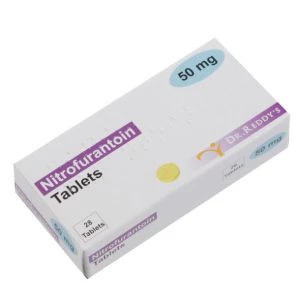The usual dose of Nitrofurantoin to treat a urinary tract infection is either 100mg taken twice a day or 50mg taken 4 times a day.
Severe infections may need a higher dose of 100mg taken 4 times a day. To treat an uncomplicated urine infection it is normally advised to take a course of Nitrofurantoin for 3 to 7 days.
Doses should be spaced evenly throughout the day. For example, if you’re taking Nitrofurantoin twice a day, leave 12 hours between each dose. If you’re taking it 4 times a day, this will usually be first thing in the morning, at about midday, late in the afternoon, and at bedtime.
If you’ve had several UTIs in a short space of time, your doctor might ask you to take a dose once a day at bedtime for a longer period of time (usually six months) to prevent it from coming back.
It is normally advised to take Nitrofurantoin with food- either a meal or a snack. Taking it on an empty stomach can make you feel sick.
If you forget to take a dose at the correct time, take one as soon as you remember, unless it’s nearly time for your next dose. You shouldn’t take two doses together to make up for a missed dose.

The recommended treatment for cystitis is 100mg Nitrofurantoin taken twice daily, or 50mg taken 4 times a day.
What is cystitis and what causes it?
Cystitis is an inflammation of the bladder which is typically caused by a urine infection. Symptoms can include:
- Feeling as if you need to pass urine just after you’ve already gone to the toilet
- Needing to pass urine frequently
- Burning or stinging feeling when you urinate. Women sometimes describe this as feeling like they are ‘peeing broken glass’.
Other, less frequent symptoms of cystitis include blood in the urine, fatigue and experiencing discomfort in the stomach area. Your urine may also become cloudy and more pungent, but this isn’t necessarily an indication of cystitis without any of the other symptoms listed above.
Urine infections are normally caused by bacteria that originate in the bowel. Some bacteria live in and around your anus without causing any harm, but sometimes they get into the into urethra. From there they can reach the bladder and multiply, causing a urinary tract infection.

In the most mild of cases cystitis may clear up on its own, for all other cases you can order cystitis medication from PostMyMeds with free next working day delivery.
Will cystitis go away on its own?
Whether cystitis clears up on its own normally depends on how severe it is. Not taking any treatment may be an option if symptoms are very mild (and if you’re otherwise healthy and not pregnant). In these cases, cystitis may go away by itself after a few days. However, symptoms can sometimes last for a week or so if you don’t take antibiotics.
If you have a mild UTI you should avoid drinking alcohol, coffee or citrus juices (which include orange, lemon, lime and grapefruit), as they can irritate the bladder. Go to the bathroom when required and drink plenty of fluids.
Many people swear by drinking cranberry juice for urine infections, but the the National Institute for Health and Care Excellence (NICE) says there isn’t enough evidence to recommend this approach.
Which antibiotic is best for a UTI?
There are a number of different treatments you can take for cystitis, including:
- Trimethoprim/sulfamethoxazole (Bactrim, Septra, others)
- Fosfomycin (Monurol)
- Nitrofurantoin (Macrodantin, Macrobid)
- Cephalexin (Keflex)
- Ceftriaxone
You can order Nitrofurantoin 50mg tablets online here at PostMyMeds. All you need to do is fill out a short online consultation form and our pharmacists will make sure it is dispatched as soon as possible. Depending on the delivery option you choose, you can have your medication in as little as 24 hours.
Nitrofurantoin is highly effective in in the treatment of UTIs in females. It is now considered as the first line treatment for uncomplicated cystitis and your symptoms should improve within two days of starting treatment.
We also offer Trimethoprim, but because Nitrofurantoin is more effective, it’s normally the first choice unless it isn’t well tolerated.
What are the side effects of Nitrofurantoin?
Common side effects associated with Nitrofurantoin include:
- nausea
- vomiting
- loss of appetite
- stomach pain
- diarrhea
- weakness
- dizziness
- headache
- drowsiness
- numbness in your hands and feet
- pain in your hands and feet
Some people might experience more severe side effects. Although Nitrofurantoin is a commonly prescribed antibiotic in the UK, it may not be suitable to use for people suffering with certain conditions or using certain medications. You should always read the patient information leaflet (PIL) for Nitrofurantoin before taking this medication to ensure it is safe for you to use.





